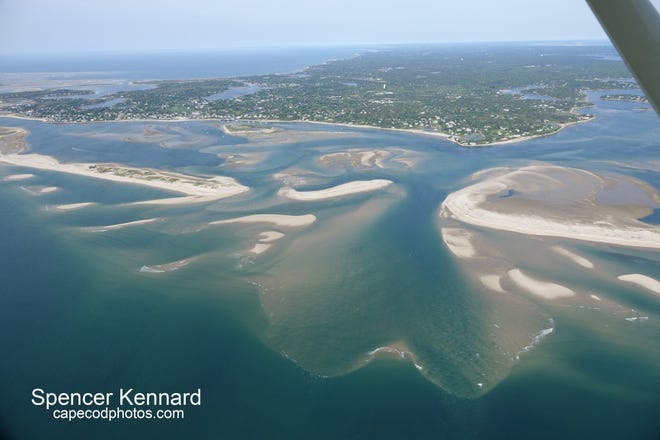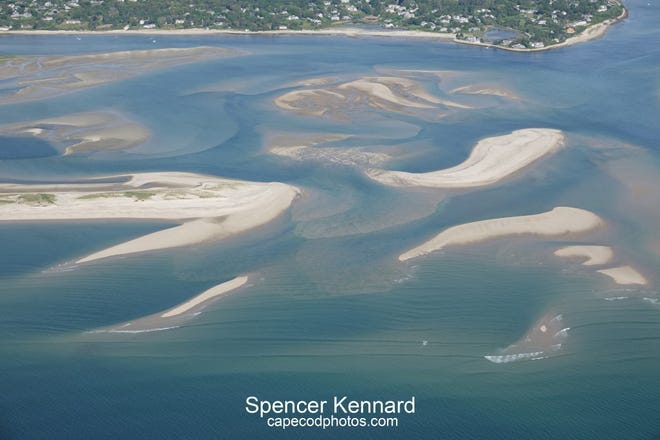May storm opened new Chatham inlet.
{Thanks for your "likes". They help people interested in coastal issues find this substack. Best, Bill Sargent
First break
Ocean breaks through Chatham’s barrier beach – again. Boaters urged to steer clear.
Cape Cod Times
A new break has formed at the tip of North Beach Island in Chatham, following a nor'easter on May 22.
Local officials are urging boaters to avoid the area due to unsafe and unpredictable conditions caused by the break.
The break is considered part of the natural shifting of the barrier beach system and is being monitored by officials.
The powerful May 22 nor'easter has reshaped Chatham's coastline, creating a new break in the Outer Beach at North Beach Island — just south of the usual boating route to the ocean.
With the breach showing no sign of closing back up, local officials are urging boaters to steer clear because of unsafe and unpredictable conditions.
“The break just kind of clipped the tip of the island,” said Harbormaster Jason Holm. “It was just the very top of North Beach — maybe 150 yards south of the North Inlet.”
He explained that the storm breached a narrow stretch — about 100 to 200 yards wide — where sand had already been worn down. Once the water pushed through, it swept everything out through the new gap.
“When it broke through, it kind of shoaled up that area,” Holm said, referring to the build-up of sand in spots that were once deeper. Shoaling can create hidden shallows that are difficult to spot — and easy to run aground on.
Coastal Resilience Director Catherine Ricks said the break is part of the natural and ongoing shift of the barrier beach system. A similar breach happened in 2007, creating the now heavily used North Inlet.
“This area will continue to be dynamic and is being observed by the harbormaster and Coast Guard for safe navigation,” she said. “Navigational aids are being shifted to assist with safe navigation through the inlet as this new break changes the ebb and flood tide strength and patterns, as well as the newly shoaled areas the break has developed.”
Holm said it took a few days to safely assess the new break. Officials were able to do that on May 28, and also had aerial photos taken to help them understand what’s happening.
In recent days, they’ve moved buoys around and redirected traffic around the area, though they’ve chosen not to place new navigational aids at the break itself.
“Until the sand really stops moving around, it’s kind of hard to know what’s happening,” Holm said.
Buoys were removed from the area of the break “so people don’t get confused," he said.
He is strongly urging mariners to not even approach the opening because of strong currents that could suck them in. The conditions are especially dangerous during easterly winds and outgoing tides, he added.
“A lot of people are curious and wanting to check it out,” Holm said. Officials are worried about such ambitious mariners "wanting to try it," he said. A few boaters were seen going through on the high tide, he said — a dangerous maneuver even for experienced mariners.
“It’s not a very forgiving place, especially for the novice boater,” he said, referring not just to the new break, but to the entire area.
Breaks aren't new for Chatham. Most of the time, a break may form because of a washover from a storm surge and will quickly close up after a few days. But sometimes they remain open, deepen and become more semi-permanent features.
Holm said “we did have this April Fool’s cut that broke through in 2017 or 2018 that developed rather quickly between Chatham Harbor and Amos Point.”
That opening remains.
Town officials and the Coast Guard are continuing to monitor the area. At present, the North Inlet is still the main route for boats heading out from Pleasant Bay or Ryder’s Cove to the Atlantic. The South Inlet, just past Lighthouse Beach, is another option.
Boaters can learn about how navigation in Chatham’s waters have changed since last summer at the annual harbor update on June 14, 10-11:30 a.m., at the Chatham Orpheum Theater, 637 Main St.
Holm, joined by Harwich Harbormaster John Harker; Ross Comstock, the officer in charge of the Coast Guard station in Chatham, the Cape Cod Sail and Power Squadron and the USCG Auxiliary, will share what’s new on the water and in the local harbors.
The event is free and open to all. No registration is required.
Heather McCarron writes about climate change, environment, energy, science and the natural world, in addition to news and features in Barnstable and Brewster. Reach her at hmccarron@capecodonline.com.








